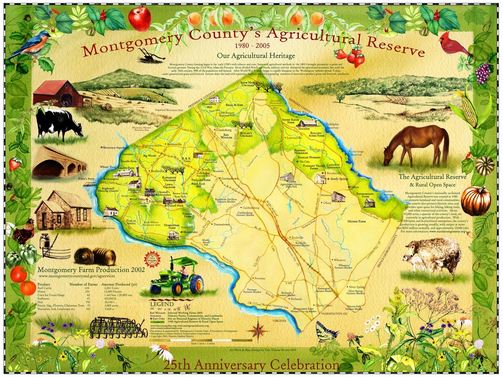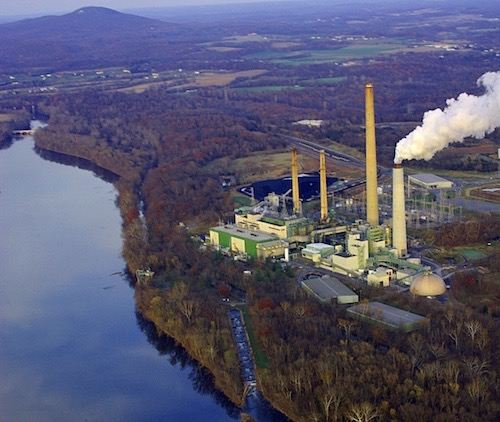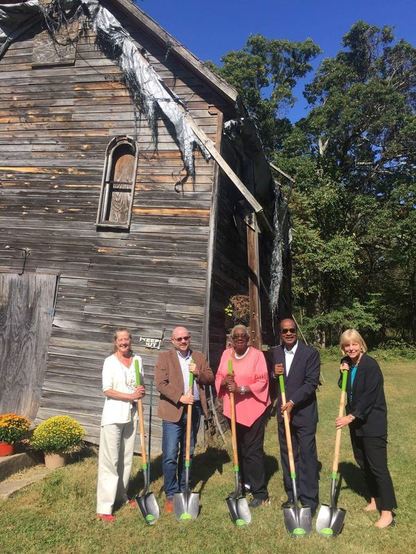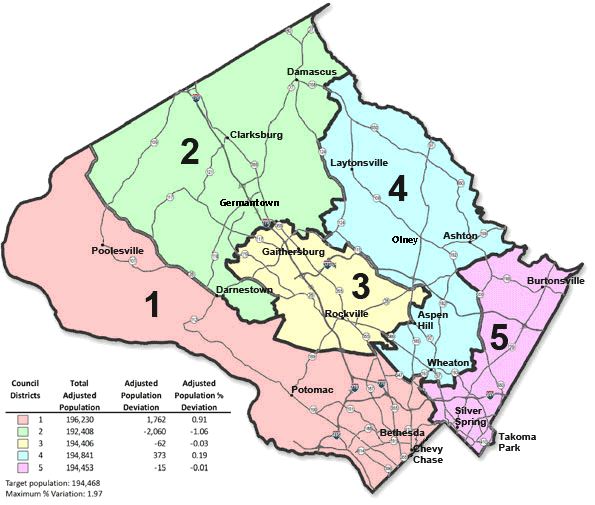Land Use Planning – Transportation: A forward thinking resolution
We added our voice and effort in support of a sound County Council Resolution ensuring that upcounty land use planning maintains balance with current and approved transportation infrastructure. First rule: When in a hole, stop digging. Happy to report that the resolution passed 7-2. Hats off to the TAME Coalition and County Councilmembers for getting this done.
Changes to how that County determines under what circumstances to extend public sewer systems has prompted concern for a number of civic and environmental groups. MCA has been working with community members on site-specific concerns for some time but the recent application of the conflicting policies to the full County Water Sewer update has escalated the need for action. Conservation Montgomery pulled together the concerns and sent correspondence to the Council, Executive and others. In conveying the letter from 16 groups and individuals, Caren Montgomery of CM writes:
The letter asks you and the entire Council to re-affirm your commitment to the low-density areas that are the gateways to our Agricultural Reserve and drinking water supply areas. Accordingly, we request your support for a Water and Sewer Plan and policy that maintains and upgrades the septic systems that now serve these areas. Master Plans, including those for Potomac, Olney, Cloverly, and the Ag Reserve, and Maryland smart growth and clean water laws and policies, call for sewer systems to be focused in already-urbanized growth tiers, and for maintaining and upgrading existing septic systems in low-density and rural tiers.
Accordingly, we call on the Council to reject proposed changes to our Water and Sewer Plan, and its associated policies and protocols that are counter to our Master Plans and smart growth laws. As our letter indicates, we oppose changes that would pave the way for conversion of low-density neighborhoods from septic to sewer service, without documented field evidence showing septic failure, and without a clear commitment to pro-active support for maintaining and upgrading existing septic systems as needed.
Ensuring that Montgomery County’s rural school cluster is afforded equal consideration, in terms of resources and health and safety considerations, feels like an uphill battle at times. Even so, it was quite a shock to many throughout the area when on October 23 the Montgomery County Public School Board of Education introduced Superintendent Dr. Jack Smith’s Capital Improvement Program (CIP) for fiscal years 2019-2024. Absent from the CIP was the long awaited, scheduled Poolesville High School (built in 1953) modernization/replacement. The project date was set for 2023 and there is no indication of what the new date will be. To be clear, there are a number of County schools and communities with needs that should be addressed and representatives of the rural school cluster ask only for fair and equal consideration. MCA recently attended a tour of PHS and we were troubled by a number of issues that make clear the need to pursue this project in a timely manner. Just as MCA did in 2010 when Monocacy Elementary School faced closure, we will work to ensure that Poolesville High School, which serves both students and greater community stay on track for its overdue rebuild. While the Rural School’s Policy is often given verbal support by elected representatives, MCA and community leaders will press for it to be properly enacted. It matters. It is time.
Take Action: There is opportunity to help via attending public meetings and writing in.

MCA is partnering with Sierra Club and other partner groups to host a panel discussion addressing water preservation and planning in Montgomery County on December 3, 3-5pm in the MC Executive Office Building Auditorium/Cafeteria in Rockville.
The panel will:
- Begin a conversation about the impacts of development and stormwater runoff on the public water supply;
- Address how we can make growth smart enough to protect the public water supply;
- Consider proactive strategies to protect and restore watersheds upstream from area water intakes that are within the purview of Montgomery County; and
- Discuss implications for costs of water treatment and future water rates.
Scott Fosler (MCA Board member) is the keynote speaker – Scott is the current mayor of Chevy Chase and, among other achievements, is a past member and president of the County Council, when he was instrumental in the plan for the Little Seneca Reservoir as part of a two-reservoir emergency backup water supply for the National Capital Region. The plan, which was developed in response to a major drought that occurred in the 1960s, and as an alternative to a plan by the US Army Corps of Engineers for 16 reservoirs, resulted in the 1982 Water Supply Coordination Agreement among area utilities and the ICPRB, which remains in effect. The panel will be moderated by Caroline Taylor, executive director of Montgomery Countryside Alliance. We are also inviting representatives from WSSC and the Interstate Commission on the Potomac River Basin to join us on the panel.
Candidates for Montgomery County Council have been invited to provide comment on their plan for meeting the challenge of water resource protection.
MCA and partner Sugarloaf Citizens’ Association and Coalition for Smarter Growth have been working to ensure that this zombie project not take away from focus and resources more effectively spent on modern and efficient transportation projects. We met with the Transportation Planning Board (TPB) staff engaged in “sketch modeling” the various possible projects and were troubled by the methodology being employed. Those concerns were relayed at the last TPB meeting by Councilmember Marc Elrich, who is a member of the TPB. We have also been meeting with area jurisdictions to discuss transportation solutions and a commitment to opposing this project. Happy to report that Takoma park resident Seth Grimes shared that the Takoma Park City Council enacted a resolution opposing the outer crossing. See previous post for more. Baltimore Sun: "Lawmakers, environmentalists push Hogan administration for tougher pollution rules"
MCA, area stakeholders and residents testified in Beallsville at an administrative hearing regarding the issuance of a Maryland waste water discharge permit. At issue was allowing the power plant to ignore the updated discharge standards in favor of old standards dating back to the 1980’s. Keep in mind this plant has already been fined for polluting the Potomac River, just upstream from the WSSC water intake in Potomac. Cadmium, mercury, and other heavy metals would be allowed at previous standard levels. Maryland Residents deserve better! Will update when we hear the decision.
MCA has been serving Montgomery County’s Food Waste Compost Working Group – On Farm Composting Committee. The Committee is charged with drafting goals aimed at encouraging on farm composting of food waste. We will share the final recommendations when they are ready.
We have accepted an invitation to the Montgomery County Planning Department’s Agritourism Study Advisory Committee charged with discussing ways to enhance economic opportunities in agricultural education, tourism and entertainment in the Agricultural Reserve. Stay turned for updates.
| The restoration of historic Charity Loving Hall at the Warren historic site in Martinburg commenced with a groundbreaking ceremony featuring song and inspiration. County Executive Ike Leggett reminded us that what makes strong community is like “good gumbo” where each unique ingredient retains individual flavor just as our people hold history and identity. The roux, the common purpose, holds us together. We are a diverse and remarkable gumbo. Cheers to the Warren Church community members, County Council, Delegate David Fraser Hidalgo and Heritage Montgomery for making sure that history lives in enduring edifice. |
Current districts shown below
At issue- whether there should be less at-large councilmembers.
Public meeting November 8!










